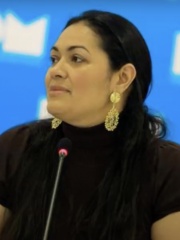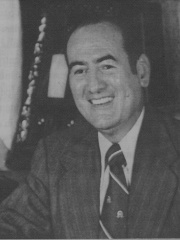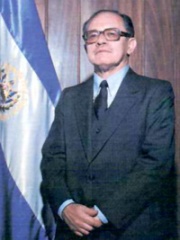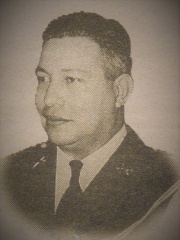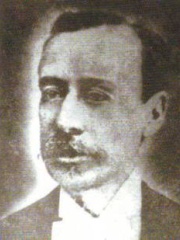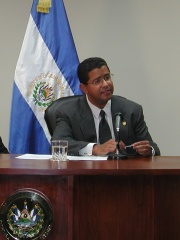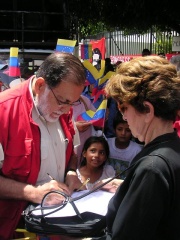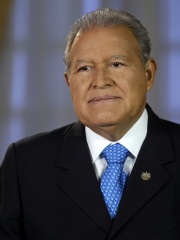
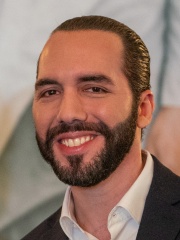
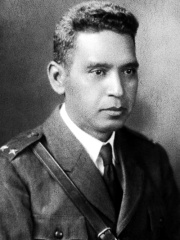
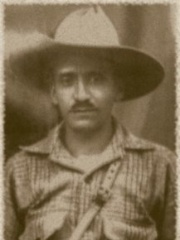
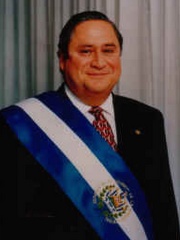
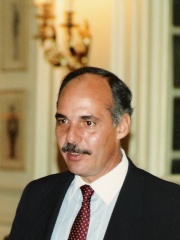
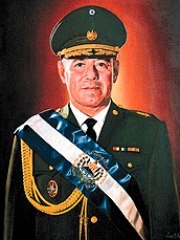
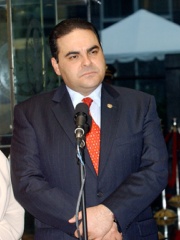
The Most Famous
POLITICIANS from El Salvador
This page contains a list of the greatest Salvadoran Politicians. The pantheon dataset contains 19,576 Politicians, 17 of which were born in El Salvador. This makes El Salvador the birth place of the 123rd most number of Politicians behind Niger, and Central African Republic.
Top 10
The following people are considered by Pantheon to be the top 10 most legendary Salvadoran Politicians of all time. This list of famous Salvadoran Politicians is sorted by HPI (Historical Popularity Index), a metric that aggregates information on a biography's online popularity. Visit the rankings page to view the entire list of Salvadoran Politicians.

1. Salvador Sánchez Cerén (b. 1944)
With an HPI of 67.58, Salvador Sánchez Cerén is the most famous Salvadoran Politician. His biography has been translated into 43 different languages on wikipedia.
Salvador Sánchez Cerén (Spanish pronunciation: [salβaˈðoɾ ˈsantʃes seˈɾen]; born 18 June 1944), also known by his nom de guerre Leonel González, is a Salvadoran former politician, guerrilla commander, and school teacher who served as the 80th president of El Salvador from 2014 to 2019. He took office on 1 June 2014, after winning the 2014 presidential election as the candidate of the left-wing Farabundo Martí National Liberation Front (FMLN). He previously served as the 49th vice president under Mauricio Funes from 2009 to 2014. He was also an FMLN guerrilla leader during the Salvadoran Civil War and is the first former rebel to serve as El Salvador's president.

2. Nayib Bukele (b. 1981)
With an HPI of 63.68, Nayib Bukele is the 2nd most famous Salvadoran Politician. His biography has been translated into 66 different languages.
Nayib Armando Bukele Ortez (born 24 July 1981) is a Salvadoran politician and businessman who has served as the 81st president of El Salvador since 2019. In 1999, Bukele established an advertising company and worked at an advertising company owned by his father, Armando Bukele Kattán. Both companies advertised election campaigns for the Farabundo Martí National Liberation Front (FMLN) political party. Bukele entered politics in 2011. In 2012, he joined the FMLN and was elected mayor of Nuevo Cuscatlán. Bukele served until his 2015 election as Mayor of San Salvador, where he served until 2018. In 2017, Bukele was ousted from the FMLN. He founded the Nuevas Ideas political party shortly afterward and pursued a presidential campaign in 2019. After the Supreme Electoral Court (TSE) refused to register his party, Bukele ran for president with the Grand Alliance for National Unity (GANA) and won with 53 percent of the vote. In July 2019, Bukele implemented the Territorial Control Plan to reduce El Salvador's 2019 homicide rate of 38 per 100,000 people. Homicides fell by 50 percent during Bukele's first year in office. After 87 people were killed by gangs over one weekend in March 2022, Bukele initiated a nationwide crackdown on gangs, resulting in the arrests of over 85,000 people with alleged gang affiliations by December 2024. El Salvador's homicide rate decreased to 1.9 homicides per 100,000 in 2024, one of the lowest in the Americas. Bukele passed a law in 2021 that made bitcoin legal tender in El Salvador and promoted plans to build Bitcoin City. In June 2023, the Legislative Assembly approved Bukele's proposals to reduce the number of municipalities from 262 to 44 and the number of seats in the legislature from 84 to 60. He ran for re-election in the 2024 presidential election and won with 85 percent of the vote after the Supreme Court of Justice reinterpreted the constitution's ban on consecutive re-election. Bukele is highly popular in El Salvador, where he has held a job approval rating above 75% during his entire presidency and averages above 90% approval, and is popular throughout Latin America. However, El Salvador has also experienced democratic backsliding under Bukele's leadership. From 2019 to 2025, El Salvador fell 61 places in the World Press Freedom Index and 24 places in the Economist Intelligence Unit's Democracy Index, which now classifies El Salvador as a hybrid regime. In February 2020, Bukele ordered 40 soldiers into the Legislative Assembly building to intimidate lawmakers into approving a US$109 million loan for the Territorial Control Plan, an event that triggered a political crisis and was described by the opposition as a self-coup. After Nuevas Ideas won a supermajority in the 2021 legislative election, Bukele's allies in the legislature voted to replace the attorney general and all five justices of the Supreme Court of Justice's Constitutional Chamber. Bukele has attacked journalists, news outlets, and furthered press censorship. Following a controversial constitutional amendment on 31 July 2025, the Legislative Assembly enabled indefinite reelection, extended presidential terms from five to six years, and eliminated the two-round system.

3. Maximiliano Hernández Martínez (1882 - 1966)
With an HPI of 62.91, Maximiliano Hernández Martínez is the 3rd most famous Salvadoran Politician. His biography has been translated into 27 different languages.
Maximiliano Hernández Martínez (21 October 1882 – 15 May 1966) was a Salvadoran military officer and politician who served as president of El Salvador from 4 December 1931 to 28 August 1934 in a provisional capacity and again in an official capacity from 1 March 1935 until his resignation on 9 May 1944. Martínez was the leader of El Salvador during most of World War II. Martínez began his military career in the Salvadoran Army, attended the Polytechnic School of Guatemala, and attained the rank of general by 1919. He ran for president during the 1931 presidential election but withdrew his candidacy and instead endorsed Labor Party candidate Arturo Araujo, who selected Martínez to serve as his vice president and later minister of war. After the Salvadoran military overthrew Araujo in December 1931, the military junta established by the coup plotters, known as the Civic Directory, named Martínez as the country's provisional president. His presidency was not recognized by the United States or other Central American countries until January 1934. The 1931 coup and Martínez's succession to the presidency allowed for the rise of a series of military dictatorships that held onto power in El Salvador until 1979. Martinez served as president of El Salvador for more than 12 years, making him the longest-serving president in Salvadoran history, and his presidency is sometimes referred to as the Martinato. In January 1932, shortly after assuming the presidency, Martínez crushed a communist and indigenous rebellion. The mass killings committed by the Salvadoran military police following the rebellion's suppression have since been referred to as La Matanza ("The Massacre") and resulted in the deaths of between 10,000 and 40,000 peasants. Martínez ruled El Salvador as a totalitarian one-party state led by the National Pro Patria Party, a political party he established in 1933 to support his 1935 presidential election campaign. The 1935, 1939 and 1944 presidential elections were uncontested, and Martínez received every vote cast. Martínez established the Central Reserve Bank and engaged in infrastructure projects such as building the Pan-American Highway in El Salvador, building the Cuscatlán Bridge in central El Salvador, and inaugurating the Nacional Flor Blanca stadium, which held the 1935 Central American and Caribbean Games. The Salvadoran economy almost exclusively relied on coffee production and exports during Martínez's presidency, particularly to Germany and the United States. El Salvador joined the Allied powers of World War II and declared war on Germany, Italy, and Japan in December 1941. Following an attempted coup in April 1944 and massive civil unrest following the execution of the coup's leaders, Martínez resigned as president in May 1944, and he and his family fled the country. In 1966, Martínez was killed in exile at his home in Honduras by his taxi driver following a labor dispute. Martínez remains a controversial figure in El Salvador. Martínez was described as a fascist and admired the European fascist movements such as those in Germany and Italy. During the lead-up to World War II, he and many of his government officials held sympathies for the Nazis and Axis powers; however, sympathizers were later purged from the government after El Salvador joined the war on the side of the Allies. Martínez was a theosophist, believed in the occult, and had a number of religious and personal beliefs his contemporaries considered unorthodox. During the Salvadoran Civil War (1979–1992), a death squad named after him claimed responsibility for the assassinations of several left-wing politicians.

4. Farabundo Martí (1893 - 1932)
With an HPI of 61.76, Farabundo Martí is the 4th most famous Salvadoran Politician. His biography has been translated into 20 different languages.
Agustín Farabundo Martí Rodríguez (Spanish pronunciation: [faɾaˈβundo maɾˈti]; 5 May 1893 – 1 February 1932) was a Salvadoran Marxist-Leninist revolutionary and activist during La Matanza.
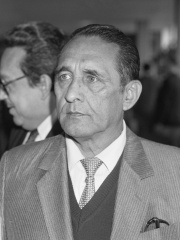
5. José Napoleón Duarte (1925 - 1990)
With an HPI of 61.06, José Napoleón Duarte is the 5th most famous Salvadoran Politician. His biography has been translated into 26 different languages.
José Napoleón Duarte Fuentes (23 November 1925 – 23 February 1990) was a Salvadoran politician who served as President of El Salvador from 1 June 1984 to 1 June 1989. He was mayor of San Salvador before running for president in 1972. He lost, but the election is widely viewed as fraudulent. Following a coup d'état in 1979, Duarte led the subsequent civil-military Junta from 1980 to 1982. He was then elected president in 1984, defeating ARENA party leader Roberto D'Aubuisson. Supported by the American Reagan Administration and the Central Intelligence Agency, his time in office occurred during the worst years of the Salvadoran Civil War, which saw numerous abuses and massacres of the civilian population by the Salvadoran security forces and the death squads linked to them.

6. Armando Calderón Sol (1948 - 2017)
With an HPI of 58.91, Armando Calderón Sol is the 6th most famous Salvadoran Politician. His biography has been translated into 26 different languages.
Armando Calderón Sol (24 June 1948 – 9 October 2017) was President of El Salvador from 1 June 1994, to 1 June 1999, representing the Nationalist Republican Alliance. He was the first president elected in El Salvador after twelve years of civil war.

7. Alfredo Cristiani (b. 1947)
With an HPI of 58.66, Alfredo Cristiani is the 7th most famous Salvadoran Politician. His biography has been translated into 27 different languages.
Alfredo Félix Cristiani Burkard (born 22 November 1947) is a Salvadoran politician who was President of El Salvador from 1989 to 1994.

8. Fidel Sánchez Hernández (1917 - 2003)
With an HPI of 58.21, Fidel Sánchez Hernández is the 8th most famous Salvadoran Politician. His biography has been translated into 22 different languages.
Fidel Sánchez Hernández (7 July 1917 – 28 February 2003) was a Salvadoran military officer and politician who served as president of El Salvador from 1967 to 1972. During his rule, Sánchez Hernández faced war and economic turmoil.

9. Antonio Saca (b. 1965)
With an HPI of 56.35, Antonio Saca is the 9th most famous Salvadoran Politician. His biography has been translated into 36 different languages.
Elías Antonio "Tony" Saca González (born 9 March 1965) is a Salvadoran politician who was President of El Salvador from 1 June 2004 to 1 June 2009. He is currently serving a minimum 10-year prison sentence on corruption charges.
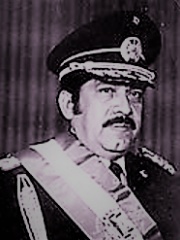
10. Arturo Armando Molina (1927 - 2021)
With an HPI of 56.13, Arturo Armando Molina is the 10th most famous Salvadoran Politician. His biography has been translated into 18 different languages.
Arturo Armando Molina Barraza (6 August 1927 – 18 July 2021) was a Salvadoran politician and military officer, who served as President of El Salvador from 1972 to 1977. He was born in San Salvador. He served between 1 July 1972 and 1 July 1977. The 1973 oil crisis led to rising food prices and decreased agricultural output. This worsened the existent socioeconomic inequality in the country, leading to increased unrest. In response, Molina enacted a series of land reform measures, calling for large landholdings to be redistributed among the peasant population. Molina was distrusted by the oligarchy and the right-wing military, and was resented by the opposition from whom he had stolen power. His attempts to silence opposition included the military occupation of the University of El Salvador in 1972, as well as violently suppressing student protests that erupted after public funds were used to hold the Miss Universe contest in San Salvador. He also oversaw assassinations of priests in the country. His regime saw extreme polarization and violence in the country. His tenure ended in 1977, and then he left the country. Molina returned to El Salvador in 1992. He died on 18 July 2021 in California, at the age of 93.
People
Pantheon has 17 people classified as Salvadoran politicians born between 1834 and 1981. Of these 17, 5 (29.41%) of them are still alive today. The most famous living Salvadoran politicians include Salvador Sánchez Cerén, Nayib Bukele, and Alfredo Cristiani. The most famous deceased Salvadoran politicians include Maximiliano Hernández Martínez, Farabundo Martí, and José Napoleón Duarte.
Living Salvadoran Politicians
Go to all RankingsSalvador Sánchez Cerén
1944 - Present
HPI: 67.58
Nayib Bukele
1981 - Present
HPI: 63.68
Alfredo Cristiani
1947 - Present
HPI: 58.66
Antonio Saca
1965 - Present
HPI: 56.35
Claudia Rodríguez de Guevara
1980 - Present
HPI: 49.68
Deceased Salvadoran Politicians
Go to all RankingsMaximiliano Hernández Martínez
1882 - 1966
HPI: 62.91
Farabundo Martí
1893 - 1932
HPI: 61.76
José Napoleón Duarte
1925 - 1990
HPI: 61.06
Armando Calderón Sol
1948 - 2017
HPI: 58.91
Fidel Sánchez Hernández
1917 - 2003
HPI: 58.21
Arturo Armando Molina
1927 - 2021
HPI: 56.13
Carlos Humberto Romero
1924 - 2017
HPI: 55.27
Álvaro Magaña
1925 - 2001
HPI: 55.16
Óscar Osorio
1910 - 1969
HPI: 54.97
Rafael Zaldívar
1834 - 1903
HPI: 54.57
Francisco Flores Pérez
1959 - 2016
HPI: 54.25
Schafik Hándal
1930 - 2006
HPI: 53.96
Overlapping Lives
Which Politicians were alive at the same time? This visualization shows the lifespans of the 12 most globally memorable Politicians since 1700.

